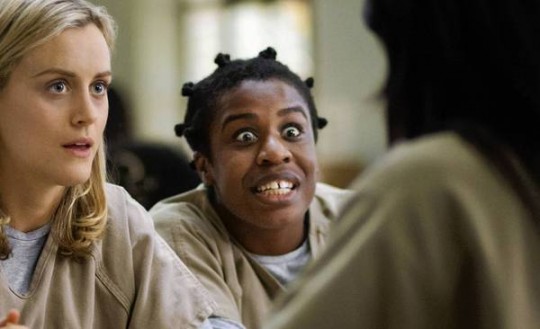There was an interesting Twitter Tiff this weekend surrounding Orange Is the New Black, Netflix’s most recent original series.* I was intrigued to see what others made of it, having finished it off in a six-episode binge. Unfortunately, the first piece I came across was this ignorant, self-parodic screed by Aura Bogado in the Nation entitled "White Is the New White."
I say "ignorant" because the author did not even bother watching the whole series; she ducked out after six episodes because it gave her a sad, or some such. Much like Glenn Greenwald before her, she felt comfortable passing judgment on a cultural object she failed to consume. This is, at best, a shoddy critical practice, one that renders her judgment not only irrelevant, but also actively harmful and detrimental to discourse surrounding the cultural product in question. And I say "self-parodic" because, well, read it.** Here’s a sample:
I first saw a poster for the new series on a subway platform. The word "black" plastered near women of all colors in prison jumpsuits made me shake my head in disappointment, but I soon forgot about it along with all the other racist images I’m surrounded by daily.
Or this:
The next time I saw a reference to Orange Is the New Black was on a giant video billboard during the massive march in New York following George Zimmerman’s acquittal in connection with the killing of Trayvon Martin. As thousands of people took to the streets against white supremacy, there was an intense irony about a fictionalized depiction of black women cheering on a prison fight as a very blond white woman stood there, shocked with horror. I crudely tweeted, "Racist shit playing W 35 and 6th. It never ends. Neither do we. #HoodiesUp," with a looping vine to illustrate my disappointment.
She was so disappointed she vined that ish. BOOM. As we are all well aware, there’s nothing like a repeating six-second video to let the world know how you really feel.
Anyway. Bogado’s article is only half the story. The reaction to the piece was almost as interesting. Because people freaked out when a writer had the temerity to point out that he thought Bogado was wrong.
This seems like a major misreading of Orange is the New Black. http://t.co/MrIpPICAQl
— Jamelle Bouie (@jbouie) August 16, 2013
What followed were a great many tweets criticizing Bouie for his (generous and gentle, frankly) criticism of Bogado’s piece. He failed to check his #MalePrivilege. He was accused of #Mansplaining.*** He botched a chance to be an ally to #woc.**** But my favorite—my absolute favorite—complaint came from the "wronged" author herself:
Questioning the ability of indigenous people to read is deeply offensive, as my people have long been called a people without writing.
— Aura Bogado (@aurabogado) August 18, 2013
This is simultaneously a remarkably dumb tweet and a remarkably insightful one. It’s dumb because Bouie obviously was not questioning Bogado’s ability to read. When one says that someone else has "misread" a cultural object the former is not suggesting the latter is illiterate. They are, rather, suggesting that their interpretation is incorrect. (Also: Orange Is the New Black is a television show. What would Bogado have misread? The occasional subtitle?)
It’s insightful because it provides a nice little window into her worldview. She clearly spends her days searching for grievances. Or, rather, she spends her days cataloguing all the grievances she feels are thrust upon her. Disagreements are illegitimate. If one fails to acknowledge the correctness of her worldview, well, they’re probably bigoted. It’s just a question of finding what kind of bigotry. So Bouie—a member of the left in good standing who is, I can assure you, an ally of women of color and hates mansplaining and despises male privilege—has to be torn down for piercing her bubble. Accusing him of being bigoted against "indigenous people" is just a handy cudgel. Who cares if it’s an accurate one to wield?
It reminded me of a recent column by Rod Liddle, a writer for the UK’s Spectator, about a few whiny Brits who swore off Twitter. Writes Liddle:
And they believe, these bores, that they are being victimised as a consequence of their race or their gender, because their entire worldview is comprised of a Manichean split between victim and oppressor, and they are always the oppressed. …
They have terribly thin skins, these people, skins as delicate as the surface tension of water. And when you investigate the pathology of this hair-trigger sensitivity, you find that it is simply that they do not like their worldview being challenged; those who do challenge it are, by definition, ‘hateful’. … This anger at social-media sites is rather an anger at the world for daring to think differently from them, an eventuality they had not hitherto contemplated.
Indeed. As much enjoyment as I derive from watching the left attack the left with leftist terms usually reserved for the hated right, I can’t help but feel a little sad. The world is a poorer place when people can’t even discuss television shows for fear of being condemned as a mansplaining racist.
* My super short review: I liked it, though I thought the handling of the characters was kind of uneven. Healy in particular was played as kind of a dope sometimes, kind of nice and thoughtful sometimes, and kind of super evil other times. The show is very entertaining, though, and an interesting window into a world not often glimpsed.
** Another reason it feels like self-parody: There’s a teaser at the end of the piece for a Nation story with the tag "Is fracking a necessary evil?" The answer, it may surprise you to find out, is "NO IT IS JUST EVIL YOU STUPID IDIOT."
*** If there’s an uglier or more aggravating portmanteau than "mansplain" and its variants, I have yet to find it.
**** "Women of Color."
